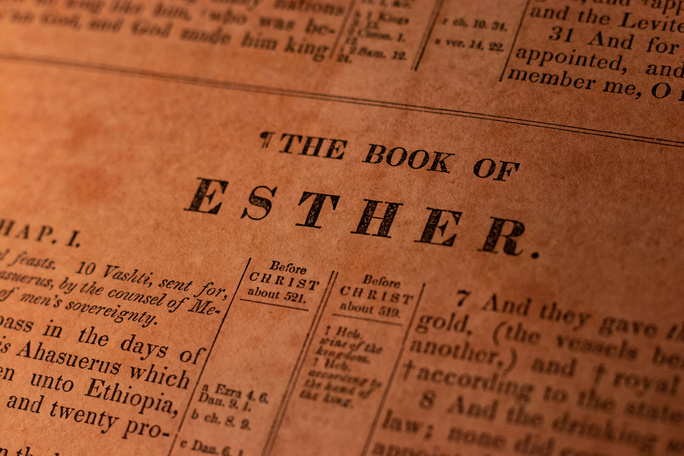The story of Queen Esther, recorded in the book named after her, revolves around the deliverance of Israel while in Persia.
Many are familiar with the story of Purim, the holiday commemorating the salvation. But there is also an underlying message of the consequences for disobedience and how God gives second chances to follow His instructions.
The story begins in fact years before Esther was even born – it started with King Saul. Going back to the story of his reign can bring greater understanding to the events found in the Book of Esther.
Before Queen Esther: Israel’s first King
In 1 Samuel 15, God told Saul to conquer the Amalekites and to wipe out everything, including the livestock. Although Saul was victorious and knew what was expected of him, he failed to keep his word.
Saul kept Agag, king of the Amalekites, alive, along with the best of livestock. Then, when the prophet Samuel confronted him, he blamed it on the people.
For this disobedience, Saul not only lost the throne, but also set in motion something he could have never foreseen. Over 500 years later, the Jews were living in exile in Persia when a personal vendetta arose.
Haman, the son of Hammedatha the Agagite (Esther 3:1), was highly promoted by the king in Persia. Haman seems to relish the high place of power he was given. But upon finding out that Mordecai the Jew would not bow to him, he was filled with rage.
The centuries-old wounds of his family line reopen, causing Haman to plan on killing all the Jews.
The Enemy of the Jews
Why such a strong response? For Haman this is not just arrogance. This is historical hatred and a personal shot at family vengeance.
Haman is an Agagite or a descendant of Agag, king of the Amalekites. While Scripture does not say, it appears that King Saul let Agag live in hopes of subjecting other nation’s royalty to his rule, as a sign of his power.
Haman may have been raised with the knowledge of his royal family lineage. He probably knew that “his” kingdom fell at the hands of the Jews.
Now that he was in power, Haman could return upon the Jews exactly what Israel did to his family. He was ready to wipe them out and “seize their possessions as plunder” (Esther 3:13). He just needed to manipulate the king to give him the authority to do it.
Ambitions of Old
Haman’s goal was to make his scheme look like he was doing it for the Persian kingdom. He expected to receive greater authority and to build a life that he felt was rightfully his. Notice his suggestion of how to honor a king’s servant that he thought was himself:
‘…let them bring a royal robe which the king has worn, and the horse on which the king has ridden, and on whose head a royal crown has been placed; and let the robe and the horse be handed over to one of the king’s most noble princes and let them array the man whom the king desires to honor and lead him on horseback through the city square, and proclaim before him, ‘Thus it shall be done to the man whom the king desires to honor.’ (Esther 6:8-9)
Haman was indirectly saying, “Let me look and feel like the king that I should have been.”
As it turned out, there was no greater personal offense to Haman than to be required to do this for Mordechai. After all, he was a descendant of the Jews that had wiped out his family’s kingdom. He was so personally ashamed and devastated by this that “Haman hurried home, mourning, with his head covered.” (Esther 6:12)
Haman vs. Queen Esther and King Ahasverus
From there, it went from bad to worse for Haman. At Esther’s dinner, his plot was uncovered. And while begging for his life, the king thought he was assaulting his queen. Haman was quickly hung on the gallows that was made for the Jews and his house given to Queen Esther.
But since the edict has gone forth from the king, the threat was not over. The king issued a new edict throughout his kingdom. It allowed and gave the Jews:
‘…the right to assemble and to defend their lives, to destroy, to kill and to annihilate the entire army of any people or province which might attack them, including children and women, and to plunder their spoil.’ (Esther 8:11)
Rising Up to the Challenge
Notice how similar this is to God’s original instructions to Saul 500 years before. God was giving the Jews an opportunity to fulfill His original command. This time, in the ensuing fight, they got it right. Haman the Agagite’s family was completely destroyed.
And chapter 9 makes the same point three times: “they did not lay their hands on the plunder” (Esther 9:10, 15, 16). After 500 years, they had completely obeyed the Lord’s command. And the feast of Purim celebrates that victory.
Queen Esther and Mordechai may not even have realized how pivotal their role was. They were concerned about their people and wanted to save lives. What may not have crossed their minds is that God was orchestrating this opportunity for centuries. He was giving them a chance to redeem a nation.
Just like Queen Esther
Ironically, Esther is the only book in the Bible where God is not mentioned. And yet He is still active and involved. It has been said that we don’t ever fail God’s tests — we just keep taking them over and over until we get it right.
In our daily circumstances, whether we recognize God’s involvement or not, He is for us. He is giving us multiple opportunities to follow His instructions. From God’s merciful perspective, when we do make the right choices, it’s worthy of a feast.

A Simple Guide Through the Biblical Holidays: Free PDF Download
You may know them as the “Jewish holidays,” but did you know the Bible calls them “Feasts of the LORD”?
We’ve put this guide together for you so that you have all you need to know about these holidays that God calls His own.
Articles Related to Purim
- Purim and Easter: What do They Have in Common?
- What is the Story of Purim? When Evil is Turned for Good
- Purim and the Four Keys to Victory
- The Kingdom of God and the History of Israel
- Why Israel: What Every Believer Should Discover
Estimated reading time: 5 minutes


